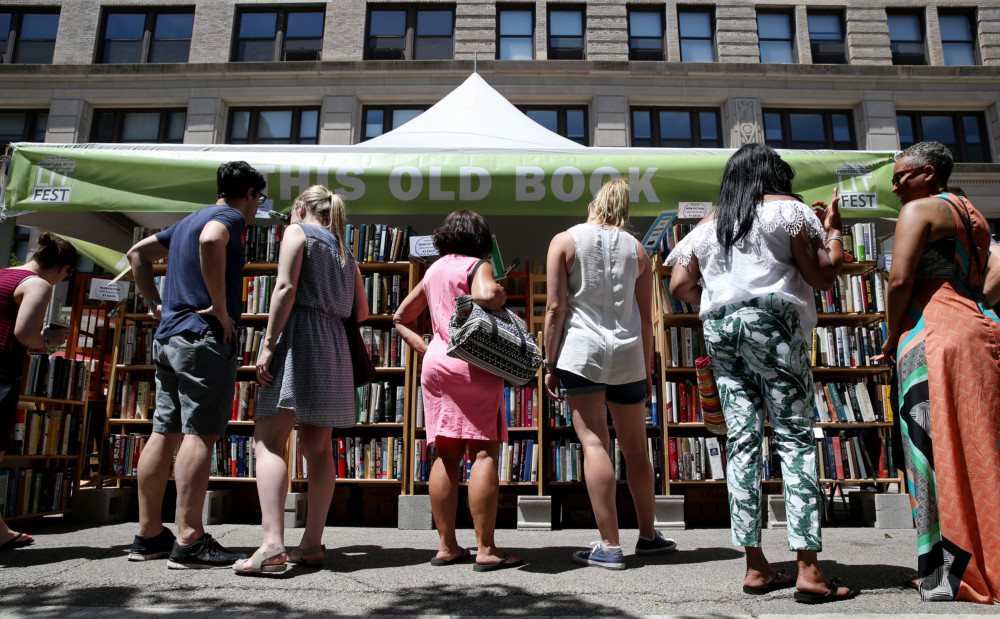By Heidi Stevens
Chicago Tribune
WWR Article Summary (tl;dr) Columnist Heidi Stevens invites us all to a conversation she will be hosting with three authors at next weekend’s 34th annual Chicago Tribune Printers Row Lit Fest.
Chicago Tribune
I’m about to come face-to-face with a whole lot of courage, and I hope you can join me.
Next weekend, June 9-10, is the 34th annual Chicago Tribune Printers Row Lit Fest, a celebration of words and the people who make a living from them.
I’ll be in conversation with three authors: David Levithan, who is receiving the Tribune’s Young Adult Literary Award, Michelle Knight, author of “Life After Darkness,” and Winnie M Li, author of “Dark Chapter.”
Levithan, a champion for diversity in teen literature, is the author of “Boy Meets Boy,” “Two Boys Kissing” and, most recently, “Sam & Isla’s Last Hurrah.” He was supposed to receive our award at last year’s Lit Fest, but he suffered a torn cornea and had to cancel.
I fell in love with Levithan’s writing after reading his 2012 novel, “Every Day,” which tells the story of A, a gentle and generous character who wakes up each morning in the body of a different 16-year-old and stays there for just one day.
“We all contain mysteries,” A explains, “especially when seen from the inside.”
Which brings us to Knight and Li, whose books take us inside their own heads and hearts in the wake of deeply painful experiences. I’ll be interviewing them together.
From left to right, ‘Dark Chapter,’ by Winnie M Li, ‘Sam & Ilsa’s Last Hurrah’ by David Levithan and ‘Life After Darkness’ by Michelle Knight. (Polis Books/Knopf Books for Young Readers/Hachette Books)
Knight, who now goes by Lily Rose Lee, was kidnapped and held captive for 11 years by Ariel Castro, who beat, raped and impregnated her repeatedly. She was 21 when she was taken by Castro. It’s been five years since she was released.
“Life After Darkness” is her story of healing, which is never linear.
“It is a process that takes time and moves in stages,” Knight writes. “I had to nurse the wounds, some of them very deep, that went all the way back to my childhood. I had to treat the injuries from years of suffering, even if I couldn’t make the scars disappear.”
Li’s “Dark Chapter” is a novel. It tells the story of Vivian, a young Taiwanese-American woman who loves to travel, mostly alone. During a hike through West Belfast, she encounters 15-year-old Johnny, who savagely rapes and beats her.
The book is based on Li’s own experience of being attacked and raped in a Belfast park when she was 29.
“Within weeks of my rape, I knew I wanted to write a novel about it,” Li wrote in Publishers Weekly last year.
“I knew I could use fiction to imagine the perspective of the other protagonist in the story: the person who had started it all, the perpetrator,” she wrote. “What kind of life had led this 15-year-old to assault and rape me that day? And, in all the years since then, had he ever considered the irreversible impact of his actions on my life?”
“Dark Chapter” explores the lives of both Vivian, the victim, and Johnny, the perpetrator, and Li infuses each character with equal humanity. It must have been excruciating to write.
“Even though rape happens with alarming frequency, our society is often reticent to think of either victims or perpetrators as real human beings, with a past, a present, a future,” Li wrote in Publishers Weekly. “There’s an implication that victims should feel ashamed of what happened, their identities hidden, that no one wants to hear about something that awful. But given the prevalence of this crime, I believe there’s a great hunger for engaging, authentic narratives about it.”
We’ll talk at Lit Fest, I hope, about why they felt called to tell their stories, to invite a not-always-friendly public to pore over their painful narratives and pick at their barely healed scabs.
They each offer glimpses of their answers to that question in their writing.
“I imagine the people who might be listening, and I think about what my words might mean to them,” Knight writes in “Life After Darkness. “I visualize a woman being bullied by her partner who hears me and begins to look at her life differently and finds the strength to make a change. I see in my head a young girl who thinks her life is worthless because people have told her she is too ugly, too fat, too skinny. … I think about the people who still need to come home as I did, and I think about the people still waiting for them to come home.
“Because I escaped,” Knight writes, “I now feel an obligation to keep speaking up about it.”
From Li, in the Publishers Weekly essay:
“Is it asking too much to consider honestly how individual lives are affected by this kind of violence, or how the violence even started? I think it’s simply asking us to be human.”
___
MORE INFORMATION
David Levithan and I will be in conversation at 11:30 a.m. June 9 at Jones College Prep, 700 S. State St., in the south auditorium. Michelle Knight, Winnie M Li and I will be in conversation at 2:30 p.m. June 9 at Jones College Prep, on the 4th floor.
___














































































































































































































































































































































































